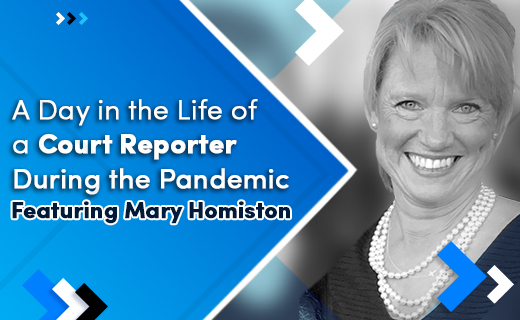
Mary Homiston is a court reporter with the State of Wisconsin for 20+ years. She has a wide variety of experience within different kinds of courts including divorce, criminal, and drug – to name a few.
Our Director of Marketing, Jessica Wein, met with Mary to ask a few pertinent questions regarding her life as a court reporter including: what piqued her interest in the profession, what education and training did she undergo, what are her daily roles and responsibilities, how they have changed as the result of the pandemic, and more.
Check out our interview below.
Jessica: Would you say that the majority of what you record are depositions or hearings?
Mary: Now it’s all hearings because I only work with a judge. When I was a freelancer, I only did depositions. I would do some medical conferences with doctors discussing how to implement different types of health insurance. You’d have a room of 70 doctors and write down what each of them said. That’s all I did for the first 6 years. Then, I had my daughter in 1994 and moved back to Wisconsin and needed the health insurance and you didn’t have that as a freelancer so that’s when I started working with the court system for the state. I’ve been toying with the idea because as a freelancer, you make 3x the amount of money that you did as an official.
Jessica: Please tell me about a typical day as a court reporter during the pandemic. How many cases do you typically record?
Mary: Our court docket is always a little bit different. Depending upon the week’s designation being either criminal or civil, we may have a full day of divorces, evictions and other civil matters or a week’s worth of criminal hearings such as arraignments, motion hearings, plea and sentencing hearings or jury trials. Because of the pandemic, any or all of these hearings may be conducted via Zoom Technology to alleviate the chance for exposure. However, all jury trials must be done in person making it a bit more difficult to coordinate so that all participants can be kept as safe as possible. Before COVID-19, all jury panels were picked the morning of trial. Now, with social distancing and other safety precautions in place, the process is more complex and thus takes more time to go through the process of voir dire. We will pick a jury the afternoon before trial in a large conference room at the KI Center in Green Bay to ensure everyone is kept as safe from being exposed to the virus as possible and then the chosen people for that jury trial will go to the courthouse the next day to start the trial.
Jessica: Are there any other ways that you feel your job’s responsibilities or process has changed as a result of COVID?
Mary: As I mentioned previously, the process of voir dire has changed tremendously given the fact that we must spread out, keeping everyone at least six feet apart. What that does is it causes a myriad of hearing issues to try to make an accurate record, having to try to hear people answering questions up to 40 or 50 feet away, rather than five or ten feet away as was historically done in a courtroom. Also, we now use Zoom Technology for all other court hearings so instead of sitting in the courtroom with the judge and the parties, I listen to all hearings over my computer in my office and make a record from my office. So my job is now a completely different animal and there’s a huge learning curve with all of this. Everyone is doing the best that they possibly can but it’s a bit of a challenge right now.
Jessica: What tips would you give to court reporters also experiencing changes to their work responsibilities as a result of COVID?
Mary: Generally speaking, court reporters are perfectionists just because of the nature of the product we are making that must be absolutely accurate. When you have all of these different policies and processes that are infiltrating your job, it’s hard not to get bent out of shape about it and not let it consume or overwhelm you. I’ve tried to stay calm enough to go with it and do the best job I can do.
You can’t control it; everything is changing so quickly. If you try to control it, it’s counterproductive and you’re unable to do it. I’ve been in this industry since 1992. So, to do your job one way for over 25 years and then all of a sudden, your whole world changes just as it has for everybody during COVID. It can be a tough transition. I think we’re all just flying by the seat of our pants here and we’re all just doing the best that we can do.
Bonus Question for MaestroVision:
What Kind of Software Should Digital Court Reporters Look For When Recording Hearings and Depositions?
Court reporters should be equipped with software that allows them to focus on their goal: producing accurate transcripts. If you’re looking for easy-to-use, reliable digital court reporting software, look no further than KEYSERV Audio software. KEYSERV Audio allows users to simultaneously record up to 8 channels of professional quality audio sources. Its friendly user interface allows users to mark or flag important audio segments with a descriptive note and records the actual date and time and displays them during audio playback. It can also be utilized with a foot pedal for playback and transcription purposes. Please visit the following link to sign up for a free demo today!

